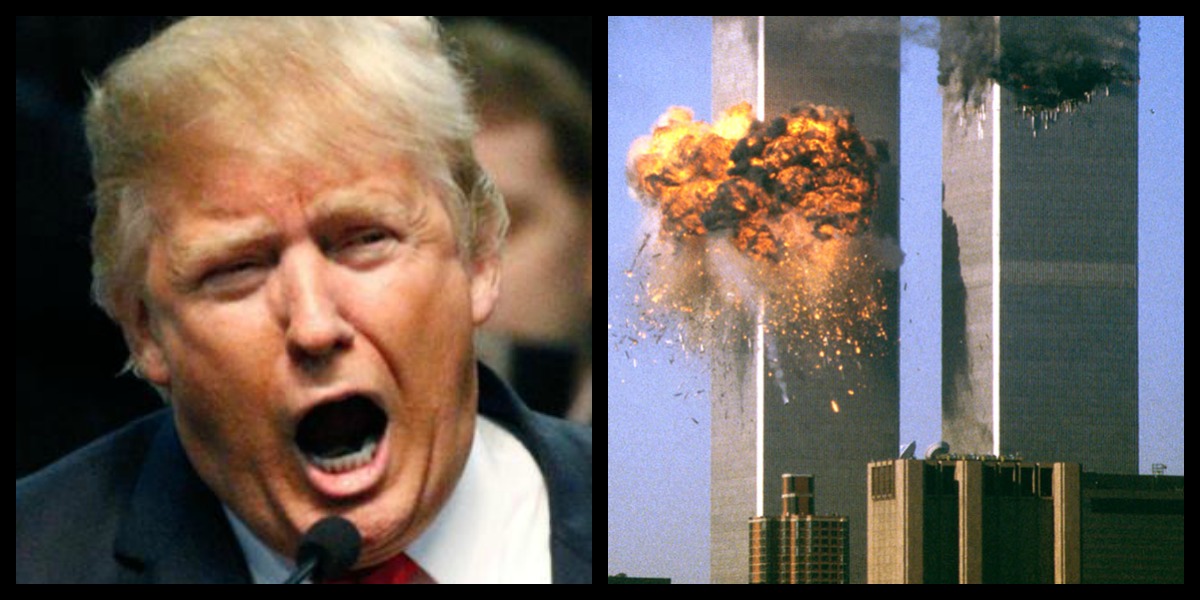
We’re all trying to figure out how a crude clown like Donald Trump — a man so ignorant of history and political science that he doesn’t even understand why he is a fascist — could become a major-party candidate for President of the United States. Many blame the Republican party, which has been demeaning itself since Barack Obama became President, and now must endure the boorish slob it deserves. Others look past party politics towards the inborn American affection for ostentatious wealth and television celebrity. A recent article by Andrew Sullivan smartly invokes Plato’s Republic, which mapped out the twisted path from democracy to tyranny thousands of years ago.
All these explanations hold some validity, but they all miss the single event that created Donald Trump’s presidential campaign: the Al Qaeda attacks of September 11, 2001.
Can you imagine Trump’s rise to power without this context, this backdrop? I can’t. The despair and helpless rage we all felt on that shocking day is still echoing in our empty heads, like a ghost not yet put to rest. We have killed Osama bin Laden, but we have not yet killed the vast fear and paranoia that he handed to us on his day of battle.
We Americans now carry an ugly xenophobia and gloomy pessimism that was not part of our national spirit before 2001. For many Americans, these unsettled feelings have rotted into something even worse: a toxic self-hatred, a hunger for immense revenge, a desire to purge. This set of emotions, I believe, is the only thing that can explain Donald Trump’s rise towards our honored highest office. We would have never sunk so low before Osama bin Laden made us hate ourselves.
We see the syndrome most clearly where it is directly obvious: in Trump’s shocking, blatantly unconstitutional and completely un-American call to exclude all Muslims from entering America. Anybody who can’t connect the dots between September 11 and this key part of Trump’s platform is being willfully blind. But we see it also in his hateful comments about Mexicans, who as scheming migrants may look to nativist Americans like Muslims in disguise.
Trump’s appeal is his blunt simplicity: keep them out! Many pundits and political analysts have puzzled over the fact that libertarian, conservative and Tea Party voters, who ostensibly embrace small government economic policies and Christian family values, would embrace a candidate who ignores both platforms. But the explanation is obvious: these conservative voters still don’t embrace Trump’s economic positions or social values, but are attracted to Trump’s toughness towards foreigners, because this toughness expresses the rage they have held in their hearts since 2001.
It’s important for us to understand the obvious roots of Trump’s appeal — and it’s also important to realize that this connection rises above the usual blathering metaphors that always come into play when political analysts try to riff on the public mood (say, that Beatlemania happened in 1964 because of Kennedy’s assassination in 1963, or that “Jaws” became a blockbuster in 1975 because of the Watergate scandal). That stuff is entertainment. This is something different.
What the United States of America experienced on September 11, 2001 can only be called trauma … and our national mood has been in a state of post-traumatic stress disorder ever since that day. George W. Bush’s misguided invasion of Iraq was the first sign of this PTSD. We Americans made a valiant attempt to come to a positive reconciliation with our trauma when we elected the calmly hopeful Barack Obama as President in 2008, but half the country’s vicious rejection of Obama’s right to be President proved that this reconciliation was still premature.
Donald Trump’s rise to potential power in 2016 is the latest manifestation of the demons that still haunt us since the day that Osama bin Laden made us feel weak in 2001. Perhaps it may change the minds of some Trump supporters if we help them understand the causality between 2001 and 2016 — and if we point out to them that the negative self-image we are presenting to the world when we present Donald Trump as a suitable candidate for our honorable highest office is the image of the United States of America that Osama bin Laden wanted the world to see.

Trump
I agree with your analysis and really appreciate your characterization of Trump. One small disagreement: "We Americans now carry an ugly xenophobia and gloomy pessimism that was not part of our national spirit before 2001." I think history tells a different story, I'm sorry to say.
thoughtful article
This was a really thoughtful article and left me with things to consider.
I see your point ...
I've been alive since the 1960s and I've seen a lot of "national moods" come and go, David -- but I do see your point, and thanks.